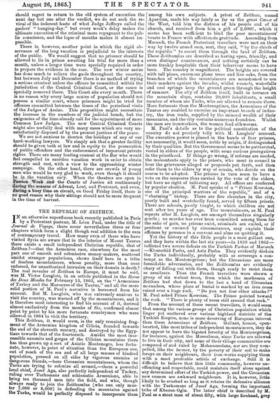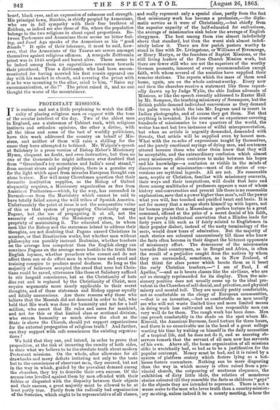THE REPUBLIC OF ZEITHUN.
IN an otherwise superfluous book recently published in Paris
by a Protestant pasteur, M. Leon Paul, under the title of Journal de Voyage, there occur nevertheless three or four chapters which form a slight though real addition to the sum of contemporary travel. How many even of those who have visited Syria are aware that in the interior of Mount Taurus there exists a small independent Christian republic, that of Zeithun ?—that the Armenian race, elsewhere for the most part one of smooth and submissive money-makers, scattered amidst stranger populations, shows itself here in a tribe of fearless mountaineers, whose penalty, more than once enforced, for unauthorized intrusion on their domain is death ? The real revealer of Zeithun to Europe, it must be said, was M. Victor Langlois, in an article published in the Revue des Deux Honda; for February 15, 1863, on the "Armenians of Turkey and the Massacres of the Taurus," and all the more solid portion of M. Paul's narrative is borrowed from his account. But M. Langlois, who was extremely anxious to visit the country, was warned off by the mountaineers, and it is therefore most interesting to find his account of it, derived almost exclusively from the monks of Sis, confirmed almost point by point by his more fortunate countrymen who were allowed in 1864 to visit the territory.
This Zeithun, it would seem, is the only remaining frag- ment of the Armenian kingdom of Cilicia, founded towards the end of the eleventh century, and destroyed by the Egyp- tians towards that of the fourteenth. Amidst the most inac- cessible summits and gorges of the Cilician mountains there has thus grown up a sort of Asiatic Montenegro, less fortu- nate, however, in point of situation than the European one, out of reach of the sea and of all large masses of kindred population, pressed on all sides by vigorous enemies or dangerous friends,—here Circassian mountaineers, whom the Turks are trying to colonize all around,—there a powerful local chief, Jusef Aga, also perfectly independent of Turkey, ruling over Turkomans and schismatic Armenians, able to bring ten thousand men into the field, and who, though always ready to join the Zeithumlus (who can only mus- ter 7,000 or 8,000) in defending the mountains against the Turks, would be perfectly disposed to inoorporate them among his own subjects. A priest of Zeithun, named Apardian, made his way lately as far as the great Catsar of the West, told him the distress of his people and of his
church, and received from him a gift of 2,000f., which it seems has been sufficient to bind the poor mountaineers' hearts to France with affectionate gratitude. Ascending from Marasch, the French Protestant travellers wore met on their way by twelve armed men, sent, they said, " by the chiefs of the republic " to escort them through the land of Zeithun. These Zeithumlus are described as having open, friendly, and even distingue countenances, and nothing certainly can be more frankly hospitable than their behaviour seems to have been. The country is magnificent. The heights are covered with tall pines, enormous plane trees and live oaks, from the branches of which the mountaineers are accustomed to use their muskets against the invader, whilst runnels, waterfalls and cool springs keep the ground green through the height of summer. The city of Zeithun itself, built in terraces on the mountain slope, contains 20,000 inhabitants, a small number of whom are Turks, who are allowed to remain there. More fortunate than the Montenegrines, the Armenians of the Taurus are enabled to exercise an important branch of indus- try, the iron trade, supplied by the mineral wealth of their mountains, and the city contains numerous foundries. Whilst the men are ironworkers, the women feed silkworms.
M. Paul's details as to the political constitution of the country do not precisely tally with M. Langlois' account. The executive power is placed in the hands of four princes, not necessarily, it would seem, noble by origin, if distinguished by their qualities. But the Government seems to be patriarchal, vested in elders of the people, with some curious prerogatives in the priesthood. If things go wrong, if reforms are needed, the malcontents apply to the priests, who meet in council to hear the grievances alleged or proposals put forth, and then refer them to the elders by way of senate, who decide on the course to be adopted. The princes in turn seem to have a veto on the measures thus carried by the vote of the elders, but have no right of initiating any. All offices are conferred by popular election. M. Paul speaks of a " Prince Kosroian, one of the principal warriors of the republic," and of a " charming" bishop. There are five churches in the city, poorly built and wretchedly found, served by fifteen priests. There are schools, poorly taught, to which children are not sent after ten years of age. The mountaineers, as M. Paul repeats after M. Langlois, are amongst themselyos singularly gentle ; no murder has ever been committed among them for the sake of gain, no prisons exist, criminals are exiled, or if penitent or excused by circumstances, may expiate their offences by penance in a convent and alms on quitting it.
Yet the history of this little people is a most gallant one, and they have within the last six years—in 1859 and 1862— inflicted two severe defeats on the Turkish Pashas of Marasch —Khurschid Pasha, and Aziz Pasha. They evidently disdain the Turks individually, probably with as sovereign a con- tempt as the Montenegrines; but the Circassians are more formidable adversaries, and the Zeithumlus are evidently chary of falling out with them,• though ready to resist them as assailants. Thus the French travellers were shown a group of six walnut trees, from which the marksmen of Zeithun had shot down to the last a band of Circassian marauders, whose place of burial is marked by an iron cross raised over a huge rock. "Do you not fear other attacks ?" M. Paul asked Prince Kosroian. The Prince pointed toward the rock. " There is plenty of room still around that rock."
From the account of these recent travellers, it would seem that among the various groups of Christian population which linger yet scattered over various highland districts of the Turkish Empire, none is more deserving of European interest than these Armenians of Zeithuu. Gallant, honest, open- hearted, like most tribes of independent mountaineers, they do not appear to have the bigoted ferocity of the Montenegrines, for instance, against the Mussulman, since Turks are allowed to live in their city, and some of their village communities are composed of and ruled by Mohammedans, nor are they com- pelled, like the former, by the poverty of their soil to make forays on their neighbours, their iron-works supplying them with a most profitable article of exchange. Still it is difficult to believe that this little community, however un- offending and respectable, could maintain itself alone against any determined effort of the Turkish power, and the Circassian new corners are awkward neighbours. It is, however, little likely to be crushed so long as it retains its defensive alliance with the Turkomans of Jusef Aga, forming the important
tribe of Khozan-Ogle. The latter chief is described by M. Paul as a stout man of about fifty, with large forehead, grey beard, black eyes, and an expression of calmness and strength. His principal town, Hatchin, is chiefly peopled by Armenians, who are in full sympathy with their free brethren of Zeithun, as indeed are also those of Sis, where the population belongs to the two religions in about equal proportions. Be- tween Turkomans and Armenians there seems no bitter feel- ing, and Jusef Aga speaks of the Armenians as his " good friends." It spite of their tolerance, it must be said, how- ever, that the Armenians of the Taurus are severe amongst themselves against religious offences. A renegade Zeithumlu priest was in 1845 scalped and burnt alive. There seems to be indeed among them no superstitious reverence towards their priesthood. Thus a Zeithumlu who had been excom- municated for having married his first cousin appeared one day with his musket in church, and covering the priest with it as he was mounting to the altar, cried to him, " Raise my excommunication, or die !" The priest raised it, and no one thought the worse of the mountaineer.































 Previous page
Previous page